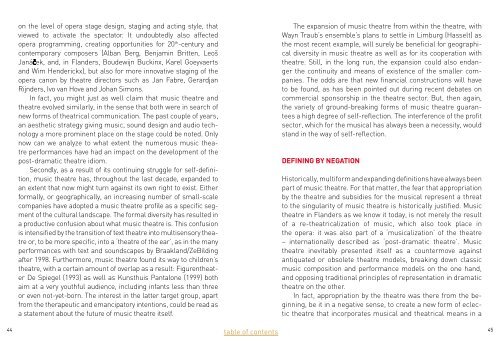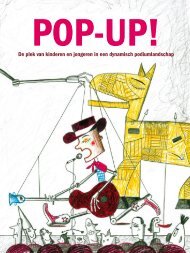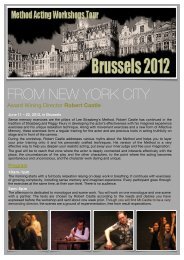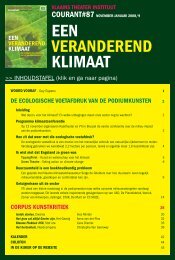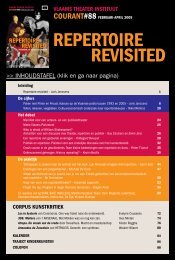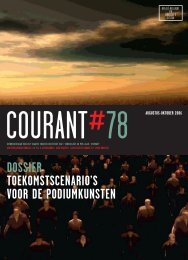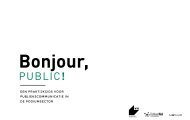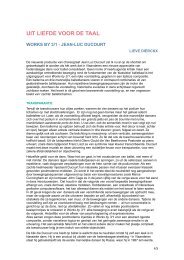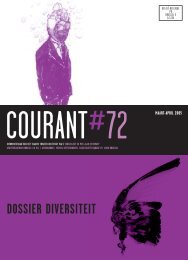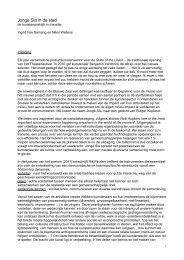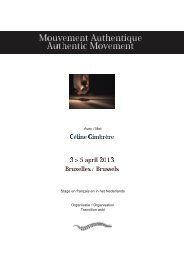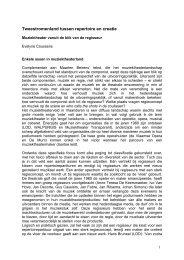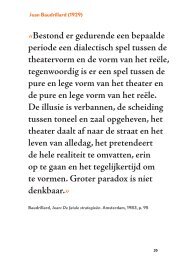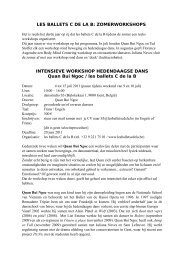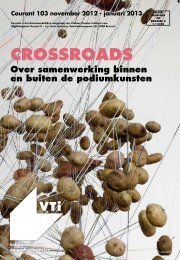music theatre in flanders - Muziekcentrum Vlaanderen
music theatre in flanders - Muziekcentrum Vlaanderen
music theatre in flanders - Muziekcentrum Vlaanderen
You also want an ePaper? Increase the reach of your titles
YUMPU automatically turns print PDFs into web optimized ePapers that Google loves.
on the level of opera stage design, stag<strong>in</strong>g and act<strong>in</strong>g style, that<br />
viewed to activate the spectator. It undoubtedly also affected<br />
opera programm<strong>in</strong>g, creat<strong>in</strong>g opportunities for 20 th -century and<br />
contemporary composers (Alban Berg, Benjam<strong>in</strong> Britten, Leoš<br />
Janáček, and, <strong>in</strong> Flanders, Boudewijn Buck<strong>in</strong>x, Karel Goeyvaerts<br />
and Wim Henderickx), but also for more <strong>in</strong>novative stag<strong>in</strong>g of the<br />
opera canon by <strong>theatre</strong> directors such as Jan Fabre, Gerardjan<br />
Rijnders, Ivo van Hove and Johan Simons.<br />
In fact, you might just as well claim that <strong>music</strong> <strong>theatre</strong> and<br />
<strong>theatre</strong> evolved similarly, <strong>in</strong> the sense that both were <strong>in</strong> search of<br />
new forms of theatrical communication. The past couple of years,<br />
an aesthetic strategy giv<strong>in</strong>g <strong>music</strong>, sound design and audio technology<br />
a more prom<strong>in</strong>ent place on the stage could be noted. Only<br />
now can we analyze to what extent the numerous <strong>music</strong> <strong>theatre</strong><br />
performances have had an impact on the development of the<br />
post-dramatic <strong>theatre</strong> idiom.<br />
Secondly, as a result of its cont<strong>in</strong>u<strong>in</strong>g struggle for self-def<strong>in</strong>ition,<br />
<strong>music</strong> <strong>theatre</strong> has, throughout the last decade, expanded to<br />
an extent that now might turn aga<strong>in</strong>st its own right to exist. Either<br />
formally, or geographically, an <strong>in</strong>creas<strong>in</strong>g number of small-scale<br />
companies have adopted a <strong>music</strong> <strong>theatre</strong> profile as a specific segment<br />
of the cultural landscape. The formal diversity has resulted <strong>in</strong><br />
a productive confusion about what <strong>music</strong> <strong>theatre</strong> is. This confusion<br />
is <strong>in</strong>tensified by the transition of text <strong>theatre</strong> <strong>in</strong>to multisensory <strong>theatre</strong><br />
or, to be more specific, <strong>in</strong>to a ‘<strong>theatre</strong> of the ear’, as <strong>in</strong> the many<br />
performances with text and soundscapes by Braakland/ZeBild<strong>in</strong>g<br />
after 1998. Furthermore, <strong>music</strong> <strong>theatre</strong> found its way to children’s<br />
<strong>theatre</strong>, with a certa<strong>in</strong> amount of overlap as a result: Figurentheater<br />
De Spiegel (1993) as well as Kunsthuis Pantalone (1999) both<br />
aim at a very youthful audience, <strong>in</strong>clud<strong>in</strong>g <strong>in</strong>fants less than three<br />
or even not-yet-born. The <strong>in</strong>terest <strong>in</strong> the latter target group, apart<br />
from the therapeutic and emancipatory <strong>in</strong>tentions, could be read as<br />
a statement about the future of <strong>music</strong> <strong>theatre</strong> itself.<br />
The expansion of <strong>music</strong> <strong>theatre</strong> from with<strong>in</strong> the <strong>theatre</strong>, with<br />
Wayn Traub’s ensemble’s plans to settle <strong>in</strong> Limburg (Hasselt) as<br />
the most recent example, will surely be beneficial for geographical<br />
diversity <strong>in</strong> <strong>music</strong> <strong>theatre</strong> as well as for its cooperation with<br />
<strong>theatre</strong>. Still, <strong>in</strong> the long run, the expansion could also endanger<br />
the cont<strong>in</strong>uity and means of existence of the smaller companies.<br />
The odds are that new f<strong>in</strong>ancial constructions will have<br />
to be found, as has been po<strong>in</strong>ted out dur<strong>in</strong>g recent debates on<br />
commercial sponsorship <strong>in</strong> the <strong>theatre</strong> sector. But, then aga<strong>in</strong>,<br />
the variety of ground-break<strong>in</strong>g forms of <strong>music</strong> <strong>theatre</strong> guarantees<br />
a high degree of self-reflection. The <strong>in</strong>terference of the profit<br />
sector, which for the <strong>music</strong>al has always been a necessity, would<br />
stand <strong>in</strong> the way of self-reflection.<br />
deFInInG by neGATIOn<br />
Historically, multiform and expand<strong>in</strong>g def<strong>in</strong>itions have always been<br />
part of <strong>music</strong> <strong>theatre</strong>. For that matter, the fear that appropriation<br />
by the <strong>theatre</strong> and subsidies for the <strong>music</strong>al represent a threat<br />
to the s<strong>in</strong>gularity of <strong>music</strong> <strong>theatre</strong> is historically justified. Music<br />
<strong>theatre</strong> <strong>in</strong> Flanders as we know it today, is not merely the result<br />
of a re-theatricalization of <strong>music</strong>, which also took place <strong>in</strong><br />
the opera: it was also part of a ‘<strong>music</strong>alization’ of the <strong>theatre</strong><br />
– <strong>in</strong>ternationally described as ‘post-dramatic <strong>theatre</strong>’. Music<br />
<strong>theatre</strong> <strong>in</strong>evitably presented itself as a countermove aga<strong>in</strong>st<br />
antiquated or obsolete <strong>theatre</strong> models, break<strong>in</strong>g down classic<br />
<strong>music</strong> composition and performance models on the one hand,<br />
and oppos<strong>in</strong>g traditional pr<strong>in</strong>ciples of representation <strong>in</strong> dramatic<br />
<strong>theatre</strong> on the other.<br />
In fact, appropriation by the <strong>theatre</strong> was there from the beg<strong>in</strong>n<strong>in</strong>g,<br />
be it <strong>in</strong> a negative sense, to create a new form of eclectic<br />
<strong>theatre</strong> that <strong>in</strong>corporates <strong>music</strong>al and theatrical means <strong>in</strong> a<br />
44 45<br />
table of contents


